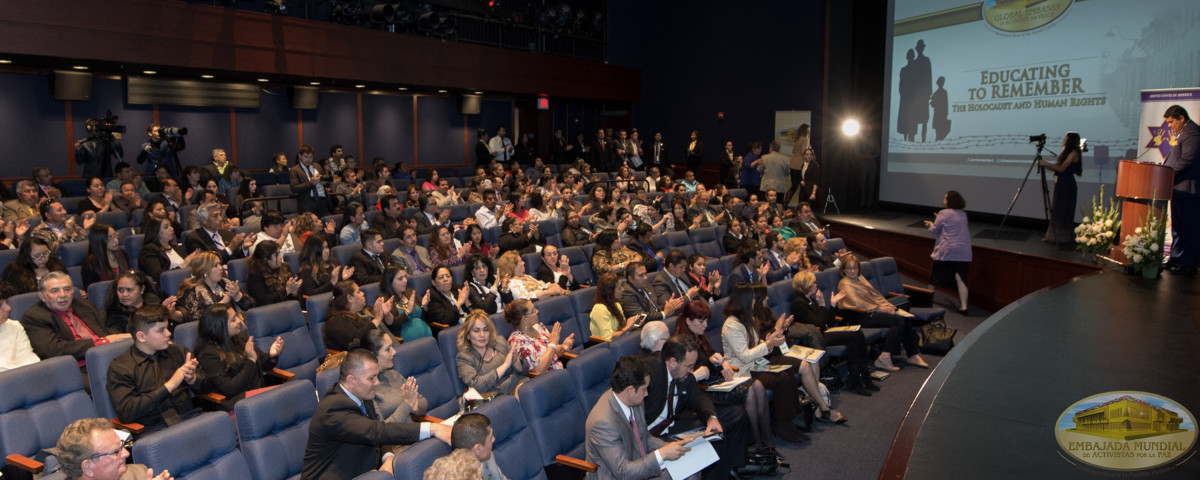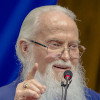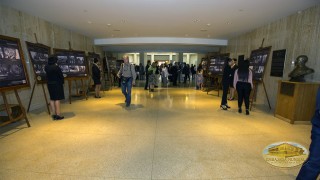Global Embassy of Activists for Peacehttps://www.embajadamundialdeactivistasporlapaz.com/sites/all/themes/emap_theme/logo.png
Global Embassy of Activists for Peace
The Holocaust, tragedy of human deaths that gave life to human rights
The International Forum "The Holocaust and Human Rights", was attended by senators, representatives of the Holocaust Museum, civil and academic authorities, and Activists for Peace of the United States, in the facilities of the Bullock History Museum, in Austin Tx, on March 13, 2017.
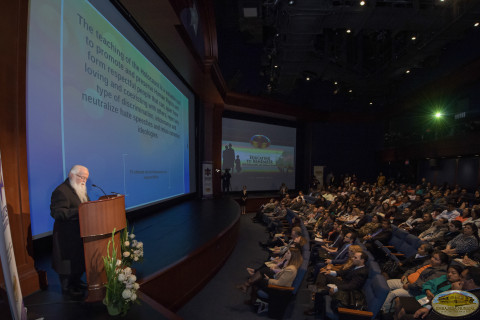 The opening of the interventions was in charge of the executive president of the GEAP who gave a tour of the lessons in human rights that the Nazi Holocaust leaves us for these times. Among his main ideas he explained that the German action during World War II fully attempted against the life of Jews, that is, aspired the total extermination of the physical body, spirit and soul of the Jewish population.
The opening of the interventions was in charge of the executive president of the GEAP who gave a tour of the lessons in human rights that the Nazi Holocaust leaves us for these times. Among his main ideas he explained that the German action during World War II fully attempted against the life of Jews, that is, aspired the total extermination of the physical body, spirit and soul of the Jewish population."By forcibly expelling them, and in different camps, subjecting them to precarious conditions of existence and forced labor, as well as to shoot and gas them: a physical attack against the body of the Jewish people.
By excluding them, denying them the expression of their identity, prohibiting them from education and the exercise of their professions, by eliminating their rights as human beings and freedom of expression by changing their names to a number: they dehumanized them. In this way, Hitler tried to kill the spirit of the Jewish people.
And by distorting their faith, depriving them of the exercise of their religion, burning their synagogues, killing rabbis, discrediting their God: he attempted against their religious beliefs, he attempted against their soul." - William Soto.
For her part, Sara Awash Jacobson, senior director of the Dallas Holocaust Museum - Center for Education and Tolerance, gave an overview of the Holocaust with special emphasis on anti-Semitism and all its expressions throughout history. Meanwhile, Charlotte Dechauster, deputy director of Education at the Holocaust Museum in Dallas, indicated the historic moment in which the atrocities of World War II became legally genocide and the recognition of what we know today as the Holocaust, as well as the emergence of the Universal Declaration of Human Rights.
"Without anti-Semitism you do not have a Holocaust. Anti-Semitism is a modern hatred of Jews as a particular race of people. Jews, by the way, are not a race of people; there is nothing racially different among Jews. There are Jews who live in Europe, Jews who live in Africa, Jews who live in Asia, who resemble the people with whom they live." - Sara Awash.
"In 1948, this is three years after the Holocaust, we have these rights fully defined. This took a war, took a Holocaust, took a trial, took world leaders together, to finally be able to say: "This is for the whole world. These are human rights. " Now, there is a problem: you cannot protect them; and then it is here when those rights are violated. Who are we looking for? This is the other path (very opposite way and, sometimes, two paths, you know, they work more or less together, but not very cohesively), it is the way to the convention of genocide». - Charlotte Dechauster.
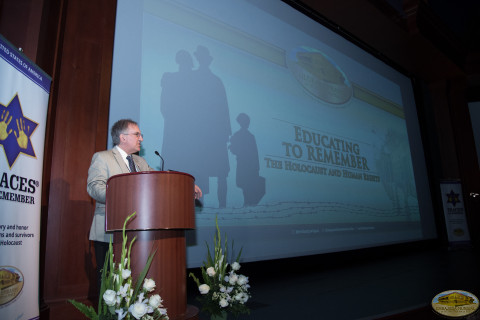 In his speech, Mr. Charles Pulman, founder and director of the institution "Why Israel Matters," spoke about the signs of the world today compared with the factors that allowed the Nazi Holocaust; and in that sense, to start read the acts that constitute the crime of genocide as defined in the Convention for the Prevention and Punishment of the Crime of Genocide, showing a comparison with the current situations that should create global alert.
In his speech, Mr. Charles Pulman, founder and director of the institution "Why Israel Matters," spoke about the signs of the world today compared with the factors that allowed the Nazi Holocaust; and in that sense, to start read the acts that constitute the crime of genocide as defined in the Convention for the Prevention and Punishment of the Crime of Genocide, showing a comparison with the current situations that should create global alert."The Nazis were experts in propaganda. The objectives are described as cleaning, purification, or perhaps against terrorism. Propaganda is used to create the fear of the target group, no matter how irrational fear is. Supplies and weapons are stored; they buy the weapons and are storing them for future use " - Charles Pulman.
In a special event framed within the work carried out by the Educating to Remember Program, the commemorative plaque was unveiled in honor of Rose Williams at the Cypress Ridge High School facilities; because the historical memory is a right of the victims, and these homages will keep alive the memory of the tragedy of the Holocaust that gave rise to the universality of human rights.
